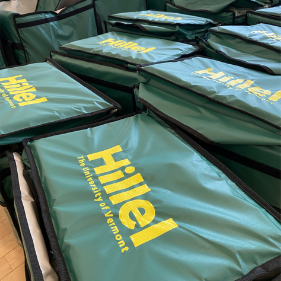Hillels across the U.S. get creative in addressing food insecurity

Campus Hillels serve many purposes. They provide students with Jewish education, social programming, a safe space, and, often, assistance with meeting basic needs.
In 2016, 47% of college students reported experiencing food insecurity, meaning they didn’t know where their next meal would come from. The COVID-19 pandemic has exacerbated existing problems — nearly three in five students reported experiencing food or housing insecurity in 2020.
As Hillels continue in their work to support students on all fronts, many leaders, both students and staff, are taking action to combat food insecurity on campuses.
Lindsey Sigal, Engagement Director at University of Vermont Hillel, says her Hillel saw a need on campus for a conversation about food insecurity and direct assistance for students. At UVM specifically, one in five students are food insecure.
In tandem with student leaders, UVM Hillel staff created “Hillel Fresh,” a free meal kit service similar to Hello Fresh or Blue Apron. The Hillel Fresh program gives students direct access to healthy, fresh ingredients and also allows them to learn about where their food is coming from and to develop long-term healthy habits. The kits include anything students might not have — cookware, seasonings, etc. The Hillel Fresh program successfully provided about 500 students with free meals last semester.
“It’s important that Hillel is there meeting students where they are,” Sigal said. “If a need is that they are hungry and don’t know where they’re going to find their next meal, how can Hillel step up?”
Leah Kostick, a junior environmental studies major at UVM and the director of the Hillel Fresh program, was immediately interested in being a part of the program upon learning about it.
“I’ve grown with this program. I call it my baby, because I feel so connected to this program on so many different levels. I feel so honored that I got to be with it as it grew to where it is today and see how many people get to experience this and learn from it,” Kostick said.
Lisa Langsner, Director of University of Hartford Hillel, has been working with other campus organizations to launch a food pantry for students in need.
“We’re seeing more students coming in with financial needs, students who are struggling with food insecurity and home insecurity. This actually started before the pandemic but didn’t really get a hold with gusto until the pandemic hit and we started to see many, many students struggling,” Langsner said.
They’re also partnering with Foodshare, a regional food bank; Aramark, the university’s food distributor; and the Jewish Federation of Greater Hartford.
Lansgner stressed the importance of community support at a small university like the University of Hartford. “We do our part to engage with the greater campus community and engage and say, ‘We are here to support you.’”
On the other coast at Stanford University, Executive Director Rabbi Jessica Kirschner was surprised to learn of food insecurity on campus, especially among Hillel students.
“It was surprising because I think we were operating under the assumption that Stanford is a place with so many resources, how could that possibly be a problem here?” Kirschner said.
The realization led to a conversation with students about what Hillel at Stanford could do to help them. The campus food pantry was a decent resource, but it didn’t give students many options. Many students also expressed feeling the stigma of food insecurity and a desire for Hillel’s help to be a “joyful experience and not a shameful experience.”
Hillel at Stanford is currently piloting a once-a-month food bank that provides more options than the campus food pantry. They’re working with local farms to provide fresh produce.
But, food security is just one piece of a greater puzzle of supporting student needs. Eventually, their goal is to have this program be a “festival of health and wellness that’s centered around Hillel and the Jewish community but is open to the campus broadly.”
In addition to campus-level efforts, Jewish organizations are making broader attempts to meet student needs.
Challah for Hunger, an educational non-profit, helps college students experiencing food insecurity through baking challah. Before the pandemic, Challah for Hunger distributed a portion of all challah sales to national philanthropic partners like Swipe Out Hunger.
In pre-pandemic times, the organization touched 10,000 volunteers every year, across 78 campuses and 10 community sites, said Rebecca Bar, executive director of Challah for Hunger.
“We talk about not just what food insecurity is on college campuses, but what students can do about it, and we give them the tools and resources to affect real change on their campuses,” Bar said.
All of these efforts come down to the Jewish value of tikkun olam, leaders said.
“Challah for Hunger is really steeped in Jewish values and wisdom,” Bar said. “Feeding the hungry is an inherent part of being Jewish.”
For Kostick, UVM’s Hillel Fresh program is a way of repairing the world. “Tikkun Olam directly resonates with the whole Earth for me,” she said. “Everyone who lives in the world — every species, every life — it’s about repairing it for ourselves and future generations.”
“The ultimate goal is to have as great of an impact as we can on as many people as we can. It’s a humanitarian problem, not just a Jewish problem,” Langsner said.